Ever since CFA Institute announced that all levels of the CFA exam will be computer-based from 2021, there have been a small but vocal subset of candidates (and charterholders) insisting that this move diminishes the value and prestige of the CFA charter.
Are they right? Probably not.
Here’s what they’ve been saying, what CFA Institute has been saying, and what we think.
“This is a cash grab. Everything is online, and yet registration fees aren’t cheaper.”
Here’s why this is nonsense.
The costs associated with candidates’ learning materials won’t change, as that remains unchanged.
That leaves costs associated with administering a computer-based exam. But is a computer-based exam really cheaper to administer compared to a paper-based exam?
If you think about it, to take a computer-based exam, a candidate will:
- Sit in a testing room (costs money to rent) and
- Tap answers into a computer (costs money to rent)
- While being watched and guided by a proctor (costs money to hire)
There are no obvious cost savings compared to paper-based testing. On top of that, CFA Institute will now have to work with a facilities provider (e.g. Pearson VUE), which as an additional supplier, will likely drive costs up further.
Grading might likely cost slightly less compared to scantron grading, I’ll give you that. But it’s not necessarily a given that computer-based exams are overall cheaper to administer.
CFA Institute have also confirmed that the costs associated with deploying computer-based exams are higher than paper exams:
“Our delivery on CBT will be more expensive for us to deliver as opposed to costing less. Think about it this way—rather than a single, massive venue and a single day of testing we will now have multiple days of testing in smaller, computer-based venues.”– Chris Wiese, Sr. Head, Exam Development with CFA Institute (via Reddit)
“The exam is shorter now. It’s not as tough.”
Does this make the exams easier? Yes and no, we think.
CFA Institute has stated that lessening testing time to 4.5 hours does not reduce assessment accuracy:
“Before planning a shift from 6 hours to 4.5 hours we invested in independent psychometric research of our examinations. We found that the incremental information produced by 1.5 hours of additional testing was negligible. In other words, we already have sufficient information after 4.5 hours of testing to reliably determine whether a candidate should pass or not.We liken this to a thermometer. You don’t receive a more accurate reading just because you use the thermometer longer.”
But we think there will definitely be a small advantage to a 4.5-hour test – you will not be as bloody tired. A tired candidate performs poorly, makes careless mistakes, recalls less information. Candidates will be more likely to produce a crappier result in a 6-hour exam than a 4.5-hour one.
The exam is focusing on testing CFA curriculum knowledge, not your exam stamina. So your superior 4.5-hour result is arguably the more accurate test of your abilities, before fatigue takes its toll.
So while you may perform better in a shorter, 4.5 hour test, this is likely a more accurate assessment of your CFA curriculum knowledge.
“Everyone and their mother will be flooding in to become a charterholder.”
“Easier to take the CFA exams” can be broken down into two facets:
- exam difficulty – how difficult is it to complete the CFA exams
- accessibility – how many people are allowed to attempt the CFA exams
Computer-based CFA exams will not be easier than paper-based CFA exams
“Our highest priority is to uphold the rigour of the CFA charter. The passing score calculations and standards will remain unchanged, so candidates who complete a computer-based exam will be held to the same standard as those who complete a paper-based exam.”
Just because everyone is free to climb Mount Everest, doesn’t mean that everyone can successfully achieve it.
Computer-based CFA exams WILL make the CFA Program more accessible, and this is a good thing
But this is a good thing.
Candidates that previously might have needed to fly to a neighbouring country just to take the exam might now be able to go to a nearby test center. With the pandemic, accessibility and smaller test groups also would be crucial to being able to hold the exams in the first place.
Does opening up the CFA charter to people who previously can’t sit for the exams for non-merit reasons diminish the value of the CFA charter? If you think so, then we should just campaign for the CFA Program to be shut down – by that reasoning, no more new candidates mean that the CFA charter will be priceless!
So CBT means that the CFA exams will be more accessible (a good thing) but equally difficult to pass as before (also a good thing).
“You can retake the exam in just 6 months! It’s not as ‘valuable’ as before when we had to wait a year.”
Referring to our CFA Exam Journey Planner, the route from Level 1 to Level 3 can be as short as 15 months, 3 months shorter than before.
OK, so candidates can theoretically get the charter sooner, or reattempt the exams at a faster rate.
So what? The cost of failing is really the cost of reregistration, materials, and most importantly the effort and time put in. Which does not change regardless of how many chances you get a year to pass the exams.
Raring to complete the CFA Program as quickly as possible would likely not be at the top of most candiates’ minds. Life gets in the way sometimes. You may be starting a new job. Health issues with yourself or a loved one. Weddings. Babies. The new schedule will make it easier to plan for all of that.
Candidates may actually end up taking longer on average to complete the exams, since postponing by 3-6 months is much less of a big deal compared to deferring a whole year like before.
Even if the wait is shorter, I’m not sure if I see how this makes the charter more valuable. It’s just flawed to think that a paper-based CFA exam pass is somehow better because you had to wait longer between exams.
So although the new schedule does offer a slightly faster route to completing the exams, this does not somehow make it easier or lower-effort to pass.
Conclusion: Computer-based testing isn’t going to devalue the CFA charter
But to compare across years is just petty and not useful. If you’re comparing across years, why not compare with 1963, when there was only one written-essay exam, and the pass rate was 94%?
The computer-based changes makes taking the exam
- more flexible from a time and location perspective,
- opens up better testing practices for CFA Institute, and
- is more pandemic-friendly.
We think this is great, and does not lower the value of the CFA charter – but perhaps it increasing it further, by using more flexible and dynamic format that reflects our current technological platforms.
Thoughts? Let me know in the comments below!
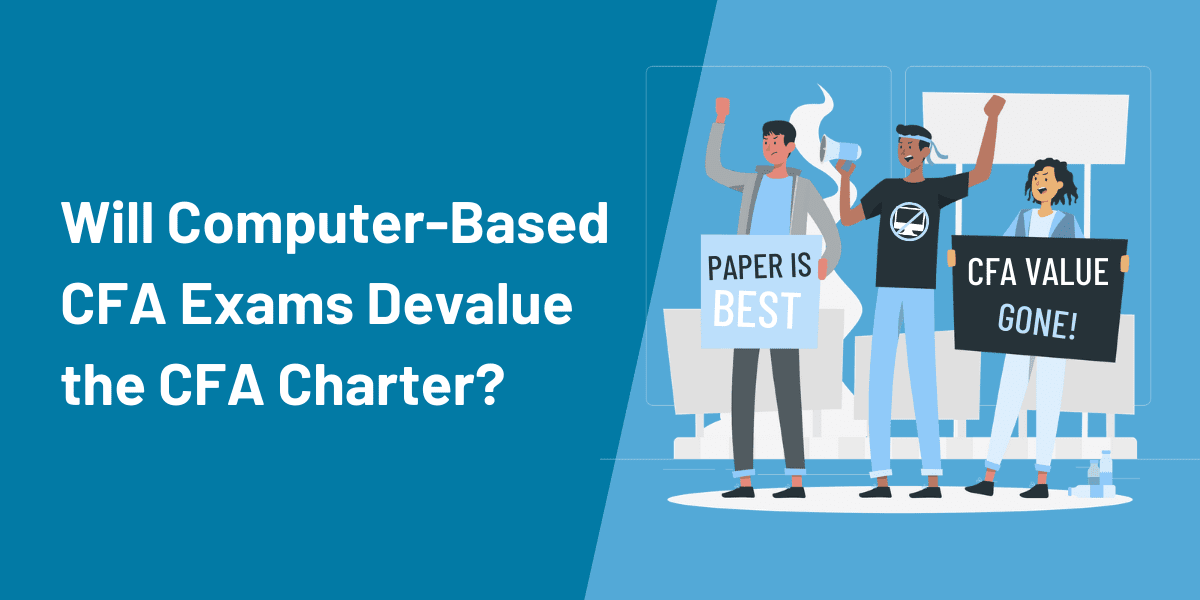
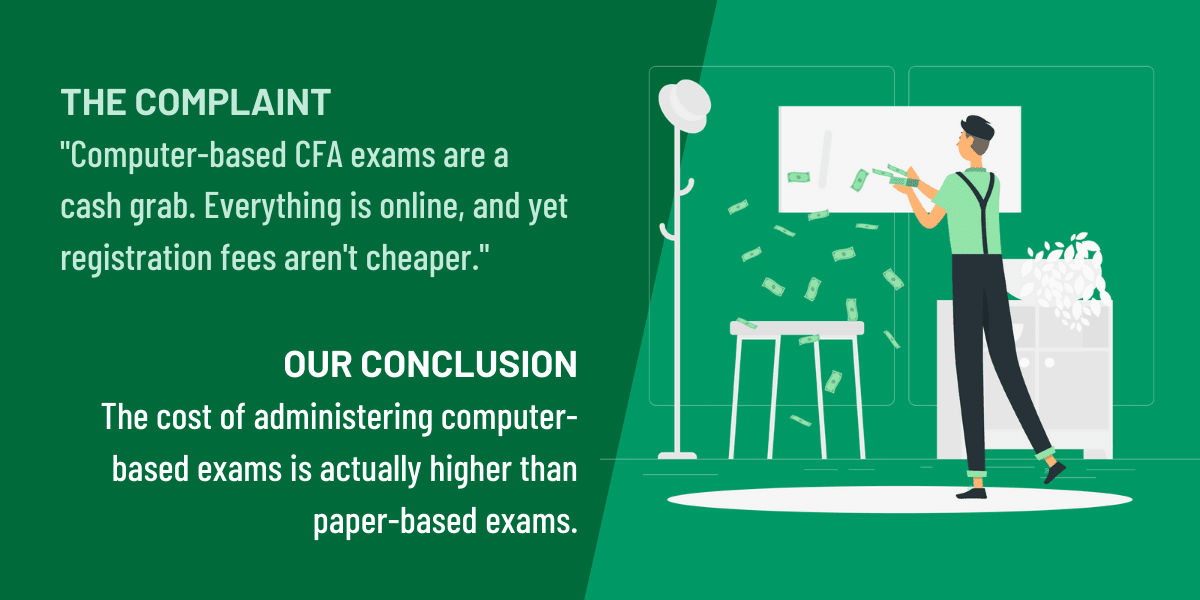
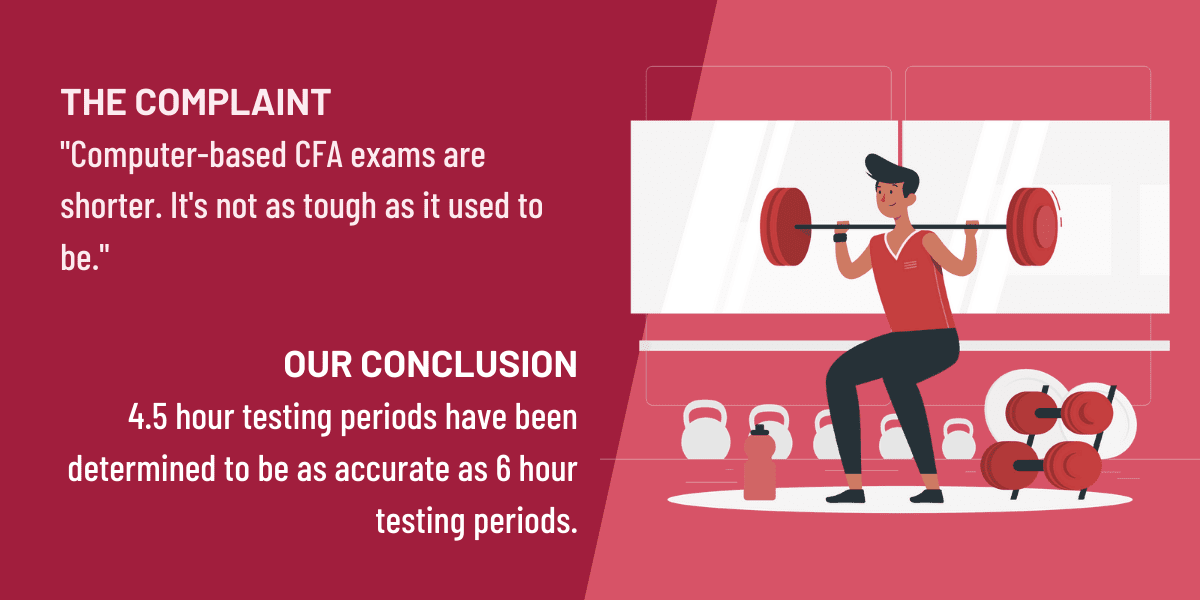
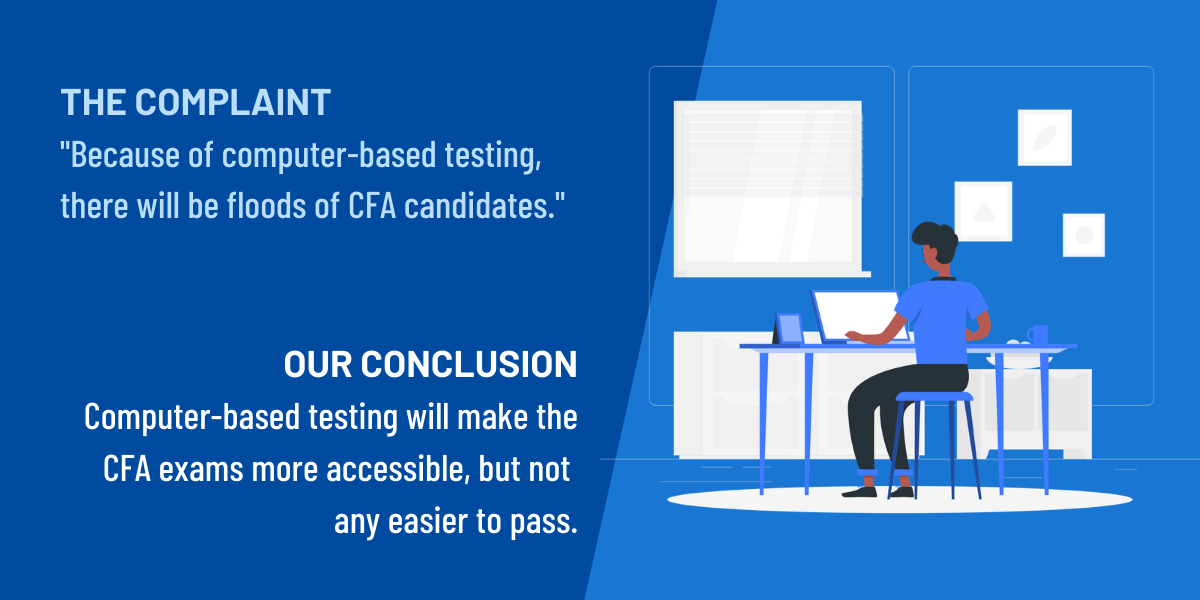
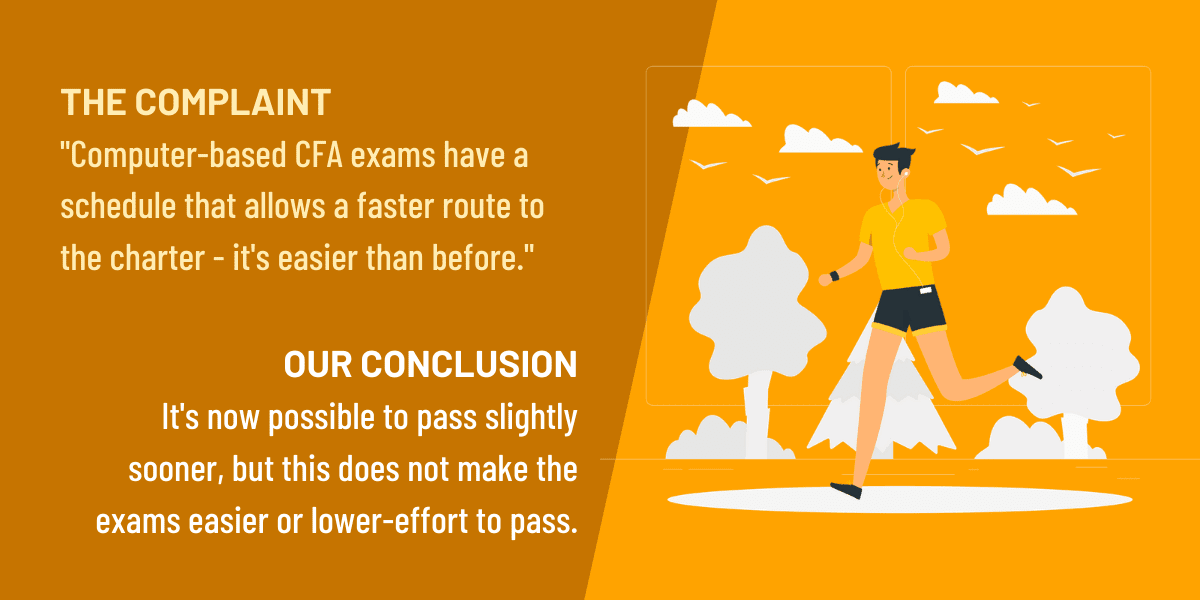
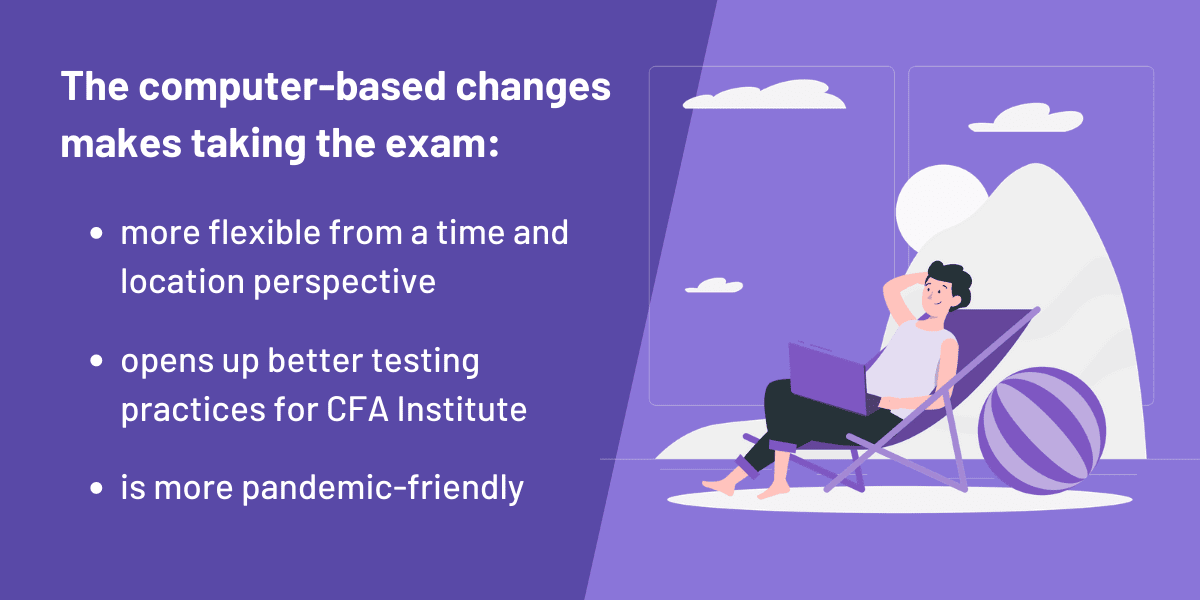

Thanks for some insight. Although, I’m still in the camp of these changes chipping away at the CFA designation’s value (I’ve passed all three exams). Up first, is there a monetary bias with this article? Do you or 300Hours receive any compensation from the CFA Institute or study prep materials or providers? Ethically, this would be good to include in the article.
The main point I think you miss is that increasing the number of attempts will make it easier to pass, when factoring in time and retention. All else equal, your exam performance will deviate with different attempts. So, by increasing the attempts, you have a better chance at passing…. the CFA exams require a decent understanding of statistics. How did they not expect us to see this one?
On the retention side, having to learn/re-learn the concepts over a year might lead to better long-term retention. Also, being able to perform well under more pressure (one attempt a year vs. two) is a very valuable trait that companies look for in employees.
On top of that, with more exam attempts and time ranges, that potentially opens the door for more errors with the testing process. I have more thoughts on the changes as well and I’m thinking of sharing a YouTube video soon with a better breakdown. And I’d really like to hear back from you before filming and publishing it.
We have no monetary relationship with CFA Institute. This article isn’t paid or anything, and while we have partnerships with materials providers they certainly don’t affect how we write things.
We always write our fair and honest opinion, and that goes both ways – sometimes we agree with candidates, but sometimes we don’t.
I guess it boils down to how ‘prestige’ is defined by various parties. If prestige is defined as ‘very few people have it’, then yes, it would be less prestigious since the changes are meant to make the CFA charter more accessible.
But if you’re talking about the ease of passing, I disagree. Passing the exams is not a chance event, so more attempts does not mean more ‘lucky dips’, but more study and practice. That does mean that candidates are more likely to pass as they attempt again, because they’ve reviewed more, not because they get a “free try”. That means more passing candidates, but the knowledge in each passing candidate is still held to the same standard.
More accessible to pass, but not easier to pass.
Of course there are still tons of logistical issues with testing, results, and pandemic postponements, but these are assumed to be ironed out in the long term. If they aren’t, then of course a different assessment will apply.
The only way the CFA Charter will be devalued is if the CFA curriculum is cut in half and replaced by 7th grade math. I don’t believe that just because more people earn a professional certification, the professional certification in question become “less valuable.” The computer-based test and more frequent opportunities to retake the test are very positive developments for the finance industry as more people working or wanting to work in finance will be able to gain valuable skills needed in the industry.
I can understand the initial negative reaction to the changes from Charter holders, I had the same thoughts. The 6-hour (plus 2-hour break) was an all-day marathon and knowing a fail meant a whole year before a retake added stress. But after thinking for a while, it all comes down to Minimum Passing Score anyway. I can’t see CFAI allowing the pass rates to rise from their current averages anytime soon so if the test is “easier” then the MPS is going to be set higher. The question is what is more difficult, 60-65% on a 6-hour test or 65-70% on a 4.5-hour test. The only way the CFA Charter gets diminished is if the pass rates start going up.
Yeah, I feel a (probably misplaced) pride in completing an all day, 6-hour marathon CFA exam that feels like a proper event with the huge crowd – took mine in London ExCel Centre which has a massive attendance. The MPS is supposed to be set from a capabilities-based perspective, rather than a quota-based one. However, I agree that I don’t expect the pass rate to fluctuate wildly post-CBT…
I actually think this will create a greater general expectation for candidates to complete the CFA exams quicker than before. Making it slightly “easier” to manage the material over longer periods with paper based testing. Can’t see it being devalued as it still demonstrates desirable traits employers seek.
That’s a good point, would be interesting to see whether there’s any impact on pass rates as a result of the more frequent testing available.